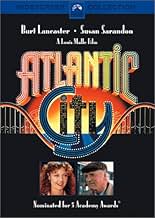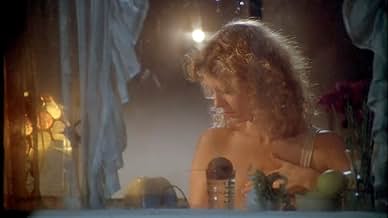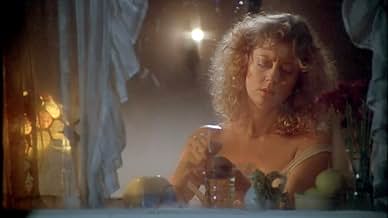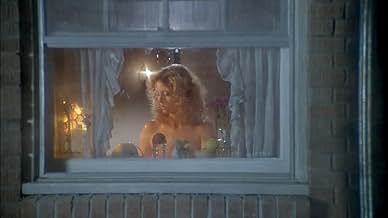In a corrupt city, a small-time gangster and the estranged wife of a pot dealer find themselves thrown together in an escapade of love, money, drugs and danger.In a corrupt city, a small-time gangster and the estranged wife of a pot dealer find themselves thrown together in an escapade of love, money, drugs and danger.In a corrupt city, a small-time gangster and the estranged wife of a pot dealer find themselves thrown together in an escapade of love, money, drugs and danger.
- Nominated for 5 Oscars
- 25 wins & 22 nominations total
Wallace Shawn
- Waiter
- (as Wally Shawn)
- Director
- Writer
- All cast & crew
- Production, box office & more at IMDbPro
7.319.4K
1
2
3
4
5
6
7
8
9
10
Featured reviews
seen all my dreams disappear, but I'm here
Louis Malle created a poetic "Atlantic City," released in 1980 and starring Burt Lancaster, Susan Sarandon, and Kate Reid. Lancaster plays Lou, a small-time mobster from the old days of Atlantic City. He is handsome, dresses very grandly, and pretends that he used to be in the big-time. Actually he worked in some menial job for a mobster and now takes care of his widow Grace (Kate Reid) who appears bedridden at first. He takes care of her dog, makes her food, rubs her limbs to increase circulation, and occasionally sleeps with her. She's verbally abusive to him. Grace came to Atlantic City in the '40s as a contestant in a Betty Grable lookalike contest, met her future husband, and never left.
Lou meets a young waitress and would-be croupier, Sally, and their lives soon collide. He's attracted to her. Sally's sister has run off with Sally's husband, and the two show up to stay with her. Her sister is pregnant. Sally's husband Dave is there to do a drug deal; he meets Lou and stores the cocaine in Lou's apartment. People are after him, so he sends Lou to someone's apartment on a delivery, and Lou is to pick up the money. When Lou arrives home after the errand, Dave is dead. The thugs didn't get their dope, so eventually they turn to Sally. In fact, Lou has the dope and also the money from the first delivery. And he plans on taking up where Dave left off.
This is such a well-done film, hearkening back to the old days of Atlantic City just as the city is being rebuilt as a eastern Las Vegas. Lou is part of the old days; Sally is ambitious and wants to better herself. Lou, never anybody, now longs to be somebody for her.
The acting is wonderful. Burt Lancaster is magnificent as Lou, an old man who still has young dreams. It's a very subtle performance, very touching and sometimes funny. Susan Sarandon does a great job as Sally, creating a totally believable character.
John Guare has written a great script, the first important component of a film, and it was in the hands of a master, Louis Malle. The film was made in Canada, and I recognized many Canadian actors, but the location shots are excellent.
Highly recommended, a sublime experience.
Lou meets a young waitress and would-be croupier, Sally, and their lives soon collide. He's attracted to her. Sally's sister has run off with Sally's husband, and the two show up to stay with her. Her sister is pregnant. Sally's husband Dave is there to do a drug deal; he meets Lou and stores the cocaine in Lou's apartment. People are after him, so he sends Lou to someone's apartment on a delivery, and Lou is to pick up the money. When Lou arrives home after the errand, Dave is dead. The thugs didn't get their dope, so eventually they turn to Sally. In fact, Lou has the dope and also the money from the first delivery. And he plans on taking up where Dave left off.
This is such a well-done film, hearkening back to the old days of Atlantic City just as the city is being rebuilt as a eastern Las Vegas. Lou is part of the old days; Sally is ambitious and wants to better herself. Lou, never anybody, now longs to be somebody for her.
The acting is wonderful. Burt Lancaster is magnificent as Lou, an old man who still has young dreams. It's a very subtle performance, very touching and sometimes funny. Susan Sarandon does a great job as Sally, creating a totally believable character.
John Guare has written a great script, the first important component of a film, and it was in the hands of a master, Louis Malle. The film was made in Canada, and I recognized many Canadian actors, but the location shots are excellent.
Highly recommended, a sublime experience.
Pretty low key film, yet still a strong performance by Lancaster. I love squeezed lemon drops too!
"Atlantic City" is overall a well done film that's pays homage to the city itself and is somewhat a going away present for legendary Burt Lancaster. The film seems low key though even though drama is present it's not your typical gangster film of blood and violence and the plot is pretty simple and not to complex. Burt Lancaster is aging mobster Lou Pascal who takes care of an aging woman in fact a deceased mobsters wife, yet Lou is still in the business and collects at random on the boardwalk. Then enter Sally Matthews(Susan Sarandon) a waitress and card dealer in training for one of the casinos has her life turned up when her sister and ex show up from Philadelphia after finding a big bag of white powder! The paths of all the characters cross, yet as I said again it's mostly low key most important the relationship of escape routes develop for the lives of both Lou and Sally upon meeting. And the scenes of seeing Susan Sarandon wash and bath by rubbing lemon juice from squeezed lemons was very sexy! Clearly one of the more erotic memories in cinema history. Louis Malle wrapped it up well by being low key ending with both male and female lead characters getting what they wanted escaping to a new life. The scenes of A.C. was great and to top it all off Burt Lancaster was very classy and smooth in his performance.
Screenwriter John Guare and director Louis Malle give tribute to people in transition, set to the back drop of a city in transition.
Set in 1970s Atlantic City in the early days of legalized gambling, we find a young woman (Susan Sarandon) working in the fish section of a casino restaurant while learning to be a card dealer. At the same time, an elderly, small-time hood (Burt Lancaster) is stuck taking care of a gangster's widow (Kate Reid). Sarandon's husband and her younger sister ran off together and unexpectedly reappear looking for a place to stay. Her sister is now pregnant and her low-life husband is trying to sell drugs stolen from a big-time dealer in Philadelphia. Sarandon's husband meets Lancaster in a bar while trying to set up a deal to sell the drugs, and he convinces Lancaster to be his "mule." Lancaster and Sarandon being neighbors -- with her brother in law as the mutual acquaintance -- are brought together and become involved in more trouble than they ever thought imaginable.
The refreshing aspect of this motion picture is that it avoids the typical Hollywood pitfall where character development and dialogue play second fiddle to car chases and stunt scenes. In Atlantic City the odious characters and sticky situations are secondary to the development/relationships of the lead characters. This is the first excellent performance on film of a young Sarandon, and one of the finest performances of Lancaster's distinguished career.
This film has been butchered on cable, VHS, and laserdisc. Please let's have a quality remaster on DVD in widescreen format.
The refreshing aspect of this motion picture is that it avoids the typical Hollywood pitfall where character development and dialogue play second fiddle to car chases and stunt scenes. In Atlantic City the odious characters and sticky situations are secondary to the development/relationships of the lead characters. This is the first excellent performance on film of a young Sarandon, and one of the finest performances of Lancaster's distinguished career.
This film has been butchered on cable, VHS, and laserdisc. Please let's have a quality remaster on DVD in widescreen format.
Rich and strange
Louis Malle, his cast, and his location really put this one over. It's well above the routine. Malle knows how to tell a story conventionally, without screaming shock effects or outsize explosions or in-your-face directorial banner headlines. When a pistol is fired, it doesn't boom like dirty Harry's. It simply pops unobtrusively. It all flows along smoothly. And it's aptly titled. The story is as much about Atlantic City as it is about the residents and visitors we meet. It's like a Robert Altman movie except that it has a fascinating narrative that draws us in.
We see the city first. A decrepit faux urban setting whose good days are long in the past. (Woodrow Wilson used to summer nearby.) It was called "the lungs of Philadelphia." It boomed as a summer resort before commercial airlines vulgarized travel and brought Miami and Bermuda within easy temporal reach of the Northeast corridor. The older apartment buildings, the ones with Queen Anne towers, are being demolished, to be replaced by the casinos that everyone assumes will bring prosperity back. (They never did. The money stayed in the casinos or went out of state.) But those sturdy old brick palaces were built to last and the apartments we see are shabby but cozy too. People have made nests in them over the years. The residents have accomodated their existences to the frames of the places they live in. People work in oyster bars, or run numbers in the falling-apart rubbish-strewn black neighborhoods. They can, if they have the money to do so, dine in reasonably good restaurants or stroll on the boardwalks, and we can almost hear the hoofbeats of yesteryear.
What modern Atlantic City is to its brassy past, Burt Lancaster is to his own history. He stalks the streets in his overcoat, wearing the only tie he owns, mutters things about how important he used to be, once having shared a cell with Bugsy Siegal. He used to have to kill people once in a while, he tells a young man confidentially. He always felt bad about it afterward and used to take a long swim in the ocean to feel clean again. "I never saw the Atlantic Ocean until today," says the kid. Lancaster turns around and looks out to sea and waves expansively. "You should of seen the ocean then," he says. "The Atlantic Ocean was really somethin' in them days." His glorious career, it turns out, has about the same epistemological status as that of the city he hasn't been outside of for the past twenty years. The Atlantic Ocean was really somethin' in them days. What a line! And Lancaster handles it well too. He's no Crimson Pirate here, just a quiet older guy with curly white hair trying to make a buck by running errands for small-time hoods, and trying to sell a silver cigarette case, a memento of his past, for "a double sawbuck." He looks exactly right too. Not "old," exactly, but well aged, like a mature burgundy. His generously featured face hasn't drooped with the passage of the years. His eyebrows are dark and set off his surprisingly gentle eyes. He doesn't clip off the terminal contours of his sentences, as he did before. It's a splendid performance.
His performance is matched by that of the other principle actors. There are some quietly amusing episodes between him and the woman he takes care of. (There is also a pretty gruesome lethal stabbing, although without blood.) Only the villains are one-dimensional villains. Susan Sarandon is marvelous as the young oyster-bar employee who wants to become a casino dealer, even if it means putting up with hits from the oily French guy who teaches the fine art of dealing in a school run by the casinos. He smokes with a cigarette holder and sounds like Charles Boyer, the swine. What a fine actress she is. Even here, dressed in threadbare clothes, her skirts around her ankles, wearing clumsy boots, her hair a mop of Scottish red, she fixes a viewer's interest when she's on the screen. She's as vulnerable under those oyster shells as Lancaster is when he discovers he can't protect her from the villains. And the two of them have a tender love scene together, and later a more raucous good time. In the end they go their separate ways -- Lancaster back to his destiny, and Sarandon in search of hers.
The characters in the film bounce around at first, at odds with one another, or simply unaware of the others' presence, but Malle draws them together into a community whose welfare we finally come to care about. It's a fine movie.
We see the city first. A decrepit faux urban setting whose good days are long in the past. (Woodrow Wilson used to summer nearby.) It was called "the lungs of Philadelphia." It boomed as a summer resort before commercial airlines vulgarized travel and brought Miami and Bermuda within easy temporal reach of the Northeast corridor. The older apartment buildings, the ones with Queen Anne towers, are being demolished, to be replaced by the casinos that everyone assumes will bring prosperity back. (They never did. The money stayed in the casinos or went out of state.) But those sturdy old brick palaces were built to last and the apartments we see are shabby but cozy too. People have made nests in them over the years. The residents have accomodated their existences to the frames of the places they live in. People work in oyster bars, or run numbers in the falling-apart rubbish-strewn black neighborhoods. They can, if they have the money to do so, dine in reasonably good restaurants or stroll on the boardwalks, and we can almost hear the hoofbeats of yesteryear.
What modern Atlantic City is to its brassy past, Burt Lancaster is to his own history. He stalks the streets in his overcoat, wearing the only tie he owns, mutters things about how important he used to be, once having shared a cell with Bugsy Siegal. He used to have to kill people once in a while, he tells a young man confidentially. He always felt bad about it afterward and used to take a long swim in the ocean to feel clean again. "I never saw the Atlantic Ocean until today," says the kid. Lancaster turns around and looks out to sea and waves expansively. "You should of seen the ocean then," he says. "The Atlantic Ocean was really somethin' in them days." His glorious career, it turns out, has about the same epistemological status as that of the city he hasn't been outside of for the past twenty years. The Atlantic Ocean was really somethin' in them days. What a line! And Lancaster handles it well too. He's no Crimson Pirate here, just a quiet older guy with curly white hair trying to make a buck by running errands for small-time hoods, and trying to sell a silver cigarette case, a memento of his past, for "a double sawbuck." He looks exactly right too. Not "old," exactly, but well aged, like a mature burgundy. His generously featured face hasn't drooped with the passage of the years. His eyebrows are dark and set off his surprisingly gentle eyes. He doesn't clip off the terminal contours of his sentences, as he did before. It's a splendid performance.
His performance is matched by that of the other principle actors. There are some quietly amusing episodes between him and the woman he takes care of. (There is also a pretty gruesome lethal stabbing, although without blood.) Only the villains are one-dimensional villains. Susan Sarandon is marvelous as the young oyster-bar employee who wants to become a casino dealer, even if it means putting up with hits from the oily French guy who teaches the fine art of dealing in a school run by the casinos. He smokes with a cigarette holder and sounds like Charles Boyer, the swine. What a fine actress she is. Even here, dressed in threadbare clothes, her skirts around her ankles, wearing clumsy boots, her hair a mop of Scottish red, she fixes a viewer's interest when she's on the screen. She's as vulnerable under those oyster shells as Lancaster is when he discovers he can't protect her from the villains. And the two of them have a tender love scene together, and later a more raucous good time. In the end they go their separate ways -- Lancaster back to his destiny, and Sarandon in search of hers.
The characters in the film bounce around at first, at odds with one another, or simply unaware of the others' presence, but Malle draws them together into a community whose welfare we finally come to care about. It's a fine movie.
Malle, Sarandon, and Lancaster Create Movie Magic
"Atlantic City" is the movie wherein my crush on Susan Sarandon (and her figure) reached full flower. She is klutzy, strong-willed, and hopeful as an aspiring casino dealer at the dawn of Las Vegas East. Burt Lancaster gives a heart-rending performance as a two-bit crook who has simply outlived all the real thugs. It was like watching a mighty oak refuse to shed its last few tender leaves before succumbing to the frigid indifference of Winter. Louis Malle keeps the movie moving along amiably, and the few weak points (the ex-husband, occasional overacting by SS, some viewers may also find BL a bit hammy for their tastes) are not particularly dire. The film evokes the spirit of the great film noirs of the 1940s and 1950s. Think Coen Bros. served with a thick glaze of sentimentality. Comic yet poignant, "Atlantic City" is one of the Best Films of the Eighties (says I).
"Tutti-frutti ice cream and craps don't mix."
"Tutti-frutti ice cream and craps don't mix."
Did you know
- TriviaJust after filming ended Burt Lancaster nearly died during a routine gall bladder operation in January 1980, requiring multiple blood transfusions.
- GoofsNear the end of the film Grace tells Chrissie that they'd both lost their men to a shooting. But Chrissie's man was stabbed, not shot.
Chrissie didn't know that. If she didn't know, a Goof can't be charged against her.
- Crazy creditsAs the end credits roll, an old building on the boardwalk is demolished to some of the tunes that appear earlier in the film. Each time the wrecking ball hits, we hear a cymbal crash and the soundtrack jumps to a different song.
- Alternate versionsThere are actually two versions of this film. The American cut is slightly shorter and has a few scenes near the beginning cut, particularly with Dave and Chrissie's journey to Atlantic City. They start out driving there in an old beat up car, which breaks down. This is in the French cut, which is available on a French blu-ray, but cut from the American cut, along with a few minor scenes in Sally's apartment once Dave and Chrissie arrive.
- How long is Atlantic City?Powered by Alexa
Details
- Release date
- Countries of origin
- Languages
- Also known as
- Atlantic City, USA
- Filming locations
- Production companies
- See more company credits at IMDbPro
Box office
- Budget
- $7,200,000 (estimated)
- Gross US & Canada
- $12,729,675
- Gross worldwide
- $12,729,675
Contribute to this page
Suggest an edit or add missing content






































